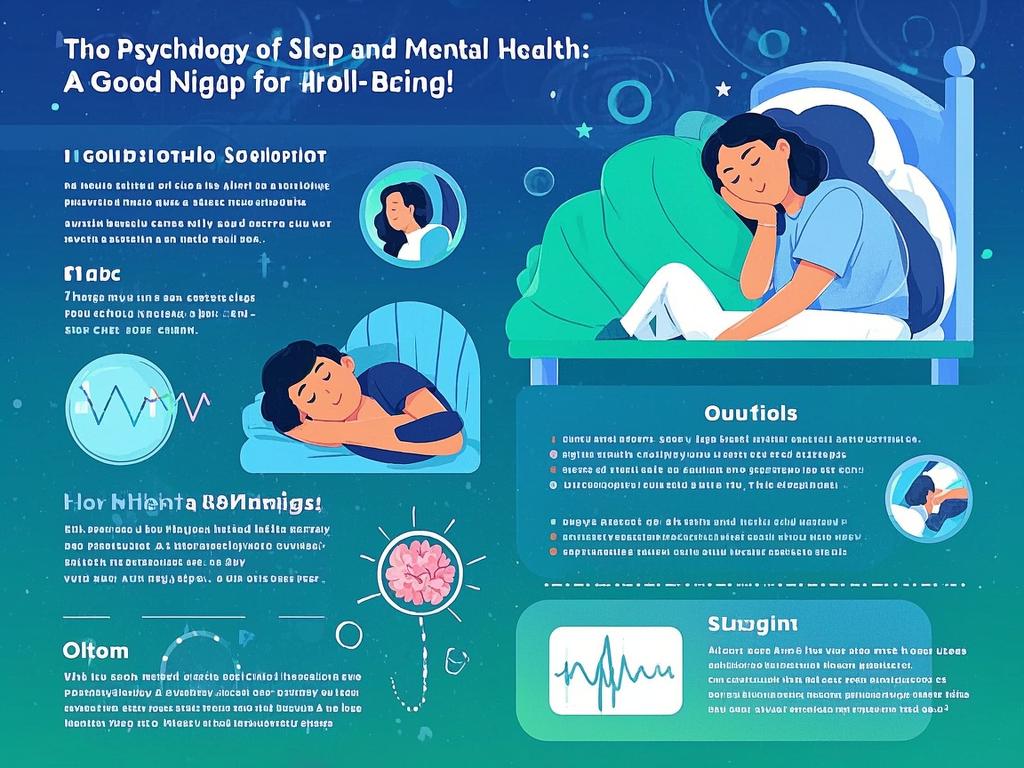
**The Psychology of Sleep and Mental Health: A Good Night's Sleep for Well - Being!**
Sleep, that mysterious yet essential realm, has long intrigued psychologists and researchers alike. It's not just a period of unconsciousness; it's a crucial player in the game of mental health. And boy, do we need to wake up to its significance!
Let's start with the basics. We spend about one - third of our lives sleeping. That's a whopping amount of time! So, it's no surprise that getting quality shut - eye is vital. According to recent studies, a lack of proper sleep can lead to a plethora of mental health issues.
First up, there's the connection between sleep and mood. Have you ever noticed how cranky you feel after a sleepless night? It's like your brain is on a rollercoaster ride, and not the fun kind. When we don't get enough sleep, our emotions can go haywire. We're more likely to be irritable, anxious, and even depressed. It's as if sleep is the conductor of the emotional orchestra in our minds, and without it, the music is all off - key.
Take, for example, the case of insomnia. Insomniacs often report feeling on edge during the day, snapping at colleagues or loved ones. Their ability to regulate emotions is severely impaired. And it's not just a short - term problem. Chronic sleep deprivation can lead to long - term mood disorders. It's like a slow - burning fuse that eventually sets off a mental health explosion.
Now, let's talk about the role of sleep in cognitive function. Our brains are like supercomputers, constantly processing information. But when we're sleep - deprived, these supercomputers start to malfunction. Memory consolidation, which is crucial for learning and retaining information, takes a hit. You know how you sometimes struggle to remember things after a bad night's sleep? That's your brain's way of saying, "Hey, I didn't get enough rest to file away those memories properly!"
Attention and concentration also take a nosedive. It's like trying to read a book with a foggy windshield. You can see the words, but they don't quite register. In a world where multitasking and quick thinking are the norms, a sleep - deprived brain is at a serious disadvantage. It's like trying to run a race with one leg tied behind your back.
But why does sleep have such a profound impact on our mental well - being? One theory is that during sleep, our brains engage in a process of self - repair and housekeeping. Toxins that build up during the day are flushed out, and neural connections are strengthened. It's like a mental spa day for our brains.
Another aspect is the role of dreams. Dreams have been a source of fascination for centuries. They're like the hidden messages our brains send us while we're unconscious. Some psychologists believe that dreams are a way for our brains to process emotions and experiences. So, if you're having vivid or disturbing dreams, it could be your brain's way of working through some mental baggage.
Now, let's get real about the challenges we face in getting a good night's sleep. In today's hyper - connected world, we're constantly bombarded with stimuli. Our smartphones, laptops, and TVs emit blue light, which suppresses the production of melatonin, the hormone that regulates our sleep - wake cycle. It's like our devices are staging a sleep coup!
We also have the pressure of work and social obligations. Many of us are burning the candle at both ends, sacrificing sleep for productivity. But here's the thing: productivity actually decreases when we're sleep - deprived. It's like trying to squeeze more juice out of an orange that's already been squeezed dry.
So, what can we do to improve our sleep and safeguard our mental health? First off, establish a regular sleep schedule. Go to bed and wake up at the same time every day, even on weekends. It's like training your brain to recognize when it's time to wind down.
Create a sleep - friendly environment. Keep your bedroom dark, quiet, and cool. Invest in a good mattress and pillows. It's like building a cozy little sleep fortress.
Limit your exposure to blue light before bed. Put away your devices or use blue - light - blocking glasses. It's like telling your brain, "Hey, it's time to relax, not time to be bombarded by digital noise!"
And don't forget about relaxation techniques. Meditation, deep breathing exercises, or a warm bath can all help you unwind before sleep. It's like giving your mind a gentle massage.
In conclusion, sleep is not just a luxury; it's a necessity for our mental health. We need to stop treating it like an afterthought and start prioritizing it. So, tonight, when you're lying in bed, take a moment to appreciate the power of sleep. It's the key to unlocking a happier, healthier you. Remember, a good night's sleep is not just about catching Z's; it's about catching a break for your mind. Are you ready to give your brain the rest it deserves? Let's make sleep a priority and see how it transforms our mental well - being!

